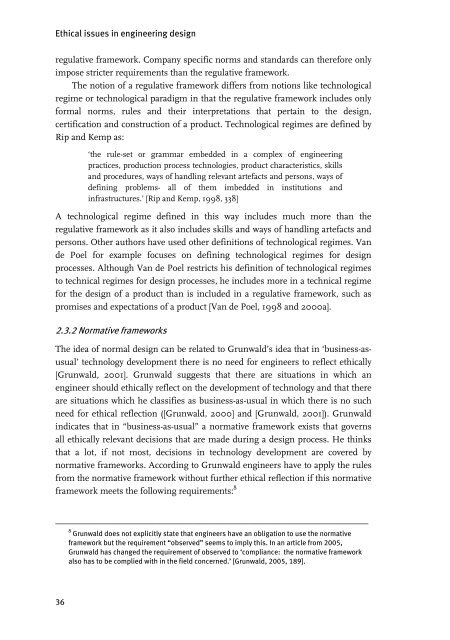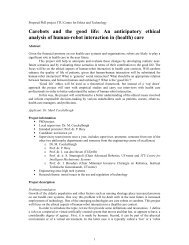Ethical issues in engineering design - 3TU.Centre for Ethics and ...
Ethical issues in engineering design - 3TU.Centre for Ethics and ...
Ethical issues in engineering design - 3TU.Centre for Ethics and ...
You also want an ePaper? Increase the reach of your titles
YUMPU automatically turns print PDFs into web optimized ePapers that Google loves.
<strong>Ethical</strong> <strong>issues</strong> <strong>in</strong> eng<strong>in</strong>eer<strong>in</strong>g <strong>design</strong><br />
regulative framework. Company specific norms <strong>and</strong> st<strong>and</strong>ards can there<strong>for</strong>e only<br />
impose stricter requirements than the regulative framework.<br />
The notion of a regulative framework differs from notions like technological<br />
regime or technological paradigm <strong>in</strong> that the regulative framework <strong>in</strong>cludes only<br />
<strong>for</strong>mal norms, rules <strong>and</strong> their <strong>in</strong>terpretations that perta<strong>in</strong> to the <strong>design</strong>,<br />
certification <strong>and</strong> construction of a product. Technological regimes are def<strong>in</strong>ed by<br />
Rip <strong>and</strong> Kemp as:<br />
36<br />
‘the rule-set or grammar embedded <strong>in</strong> a complex of eng<strong>in</strong>eer<strong>in</strong>g<br />
practices, production process technologies, product characteristics, skills<br />
<strong>and</strong> procedures, ways of h<strong>and</strong>l<strong>in</strong>g relevant artefacts <strong>and</strong> persons, ways of<br />
def<strong>in</strong><strong>in</strong>g problems- all of them imbedded <strong>in</strong> <strong>in</strong>stitutions <strong>and</strong><br />
<strong>in</strong>frastructures.’ [Rip <strong>and</strong> Kemp, 1998, 338]<br />
A technological regime def<strong>in</strong>ed <strong>in</strong> this way <strong>in</strong>cludes much more than the<br />
regulative framework as it also <strong>in</strong>cludes skills <strong>and</strong> ways of h<strong>and</strong>l<strong>in</strong>g artefacts <strong>and</strong><br />
persons. Other authors have used other def<strong>in</strong>itions of technological regimes. Van<br />
de Poel <strong>for</strong> example focuses on def<strong>in</strong><strong>in</strong>g technological regimes <strong>for</strong> <strong>design</strong><br />
processes. Although Van de Poel restricts his def<strong>in</strong>ition of technological regimes<br />
to technical regimes <strong>for</strong> <strong>design</strong> processes, he <strong>in</strong>cludes more <strong>in</strong> a technical regime<br />
<strong>for</strong> the <strong>design</strong> of a product than is <strong>in</strong>cluded <strong>in</strong> a regulative framework, such as<br />
promises <strong>and</strong> expectations of a product [Van de Poel, 1998 <strong>and</strong> 2000a].<br />
2.3.2 Normative frameworks<br />
The idea of normal <strong>design</strong> can be related to Grunwald’s idea that <strong>in</strong> ‘bus<strong>in</strong>ess-asusual’<br />
technology development there is no need <strong>for</strong> eng<strong>in</strong>eers to reflect ethically<br />
[Grunwald, 2001]. Grunwald suggests that there are situations <strong>in</strong> which an<br />
eng<strong>in</strong>eer should ethically reflect on the development of technology <strong>and</strong> that there<br />
are situations which he classifies as bus<strong>in</strong>ess-as-usual <strong>in</strong> which there is no such<br />
need <strong>for</strong> ethical reflection ([Grunwald, 2000] <strong>and</strong> [Grunwald, 2001]). Grunwald<br />
<strong>in</strong>dicates that <strong>in</strong> “bus<strong>in</strong>ess-as-usual” a normative framework exists that governs<br />
all ethically relevant decisions that are made dur<strong>in</strong>g a <strong>design</strong> process. He th<strong>in</strong>ks<br />
that a lot, if not most, decisions <strong>in</strong> technology development are covered by<br />
normative frameworks. Accord<strong>in</strong>g to Grunwald eng<strong>in</strong>eers have to apply the rules<br />
from the normative framework without further ethical reflection if this normative<br />
framework meets the follow<strong>in</strong>g requirements: 8<br />
——————————————————————————————————<br />
8 Grunwald does not explicitly state that eng<strong>in</strong>eers have an obligation to use the normative<br />
framework but the requirement “observed” seems to imply this. In an article from 2005,<br />
Grunwald has changed the requirement of observed to ‘compliance: the normative framework<br />
also has to be complied with <strong>in</strong> the field concerned.’ [Grunwald, 2005, 189].



